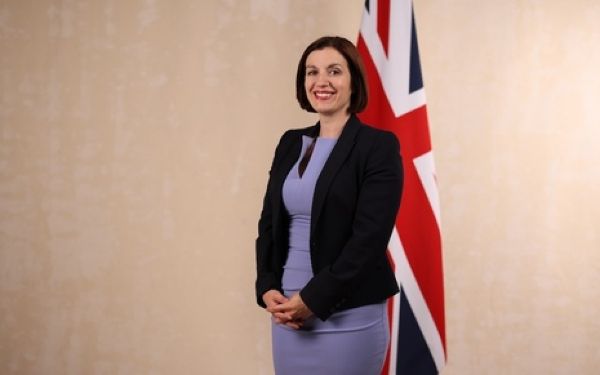
Do you support the government's plans to use AI to reform public services?
- In principle, but further research is needed to understand potential risks (50%, 312 Votes)
- No, it will cause more harm than good (34%, 211 Votes)
- Yes, AI has already proven to boost productivity (16%, 97 Votes)
Total Voters: 620
Legislation to reform children’s social care has cleared its first parliamentary hurdle.
MPs approved the Children’s Wellbeing and Schools Bill in principle yesterday (8 January 2024), following a debate in the House of Commons that saw a Conservative amendment that would have blocked the bill overwhelmingly defeated.
The bill will now be considered in detail, and likely amended, by a committee of MPs, before returning to the Commons to be further considered and voted upon, prior to consideration by the House of Lords.
With Labour’s huge majority in the Commons and the Lords unlikely to hold up the legislation, the bill is likely to become law in the spring, though some measures will not be implemented until future years.
What’s in the Children’s Wellbeing and Schools Bill?
- Family group decision making: councils considering making a court application for a care or supervision order would have to offer a family group decision making (FGDM) meeting to the child’s parents, to enable the child’s family network to make a proposal about the child’s welfare; this would not apply if the council judged it not in the child’s best interests.
- Multi-agency child protection teams: safeguarding partners (councils, integrated care boards and the police) would be required to establish at least one multi-agency child protection team in their area, to support the relevant local authority deliver its child protection duties.
- Unique child identifier: a consistent identifier would be established for each child; this must be used when professionals process information about the child.
- Supporting care leavers: the bill would require each local authority to consider whether former relevant children (up to age 25) require “staying close support”, including help to find suitable accommodation, and where their welfare requires it, to offer that support.
- Regional care co-operatives: the government would be able to require two or more local authorities to co-operate in carrying out their functions around accommodating looked-after children, forming so-called regional care co-operatives.
- Deprivation of liberty: the bill provides for the authorisation of a child’s deprivation of liberty in placements other than a secure children’s home, to tackle the high numbers deprived of liberty outside any statutory framework currently.
- Regulating provider groups: Ofsted would gain the powers to require improvements from provider groups, responsible for multiple care settings, where there were grounds for cancelling the registration of any of their settings.
- Financial oversight regime: the bill would give the government the power to monitor the finances of significant providers of children’s social care services to guard against the adverse effects of such providers failing.
- Limiting provider profits: the bill also provides for regulations to be made enabling the government to cap any profit made by a non-local authority registered children’s social care provider. The government may only make such regulations if satisfied that it is necessary to do so.
- Agency workers: the government would be able to regulate councils’ use of agency workers in children’s social care, for example, in relation to their pay and management.
- Children not in school: the bill would introduce registers of children not in school in each local authority area and require parents to gain local authority consent to home educate a child who is subject to a child protection enquiry, on a child protection plan or attending a special school.
Find out more by reading Tim Spencer-Lane’s summary of the bill’s provisions.
‘Biggest reform in a generation’
Introducing the bill, education secretary Bridget Phillipson said it was part of “the biggest reform of children’s social care in a generation”, though one inherited in significant part from its Conservative predecessor. As well as the measures in the bill, this includes:
- The England-wide rollout of the family help model in 2025-26. Family help involves merging targeted early help and child in need services into multidisciplinary teams, designed to provide families in need with better, less stigmatising support, with a view to keeping families together.
- The trialling of financial allowances for some kinship carers in order to improve their ability to care for children.
- Rolling out regional fostering hubs to improve recruitment of foster carers and tackle existing shortages.
Prioritising keeping children with families
Phillipson said that the reforms were designed to help more children stay with their families, while improving the care system for those who could not, including by tackling provider profit levels.
“Our first priority is to keep children with their family wherever it is safe to do so, so the bill mandates all local authorities to offer family group decision making,” Phillipson told MPs. “With the guidance of skilled professionals, families with children at risk of falling into care will be supported to build a plan that works for them. We are strengthening support for kinship care, so that vulnerable children can live with the people they know and trust, wherever that is possible.
“However, despite the best efforts of all involved, some children will inevitably need to enter care, so we must reform the system so that it works for them. I know that members right across this House share my outrage at the excessive and exploitative profit making that we have seen from some private providers. It is shameful, it is unacceptable, and it will end.”
Conservative opposition
Shadow education secretary Laura Trott said the Conservatives was broadly supportive of the children’s social care measures in the bill, though was opposed to its proposals to place academy schools under similar requirements to local authority schools.
Its defeated amendment also sought to require the establishment of a national public inquiry into child sexual exploitation (CSE) by grooming gangs, an issue that has triggered a huge political row because of repeated attacks on the government over the issue by X owner Elon Musk.
Pledge to introduce mandatory reporting
While the government has not ruled out such an inquiry, it has instead announced the implementation of measures proposed by the Independent Inquiry into Child Sexual Abuse (IICSA), which issued its final report in 2022. These comprise:
- Introducing mandatory reporting of child sexual abuse by those in positions of trust over children, with criminal, as well as professional, sanctions for a failure to do so.
- Creating a performance framework, with data collection requirements, for the police concerning CSA and CSE. This responds to IICSA’s recommendation to introduce a core data set for the issue, to tackle what it found was a lack of reliable data, particularly in relation to CSE. The inquiry said the data set should include information on the characteristics of victims and alleged perpetrators of CSA/CSE, including age, sex and ethnicity, the factors that make children more vulnerable to abuse or exploitation and the settings in which abuse or exploitation occur.
- Legislating to make grooming an aggravating factor in the sentencing of child sexual offences, a recommendation from IICSA’s 2022 report on CSE by organised networks.







 Bournemouth, Christchurch and Poole
Bournemouth, Christchurch and Poole  Hampshire County Council
Hampshire County Council  Oxfordshire County Council
Oxfordshire County Council  South Gloucestershire Council
South Gloucestershire Council  Wokingham Borough Council
Wokingham Borough Council  Webinar: building a practice framework with the influence of practitioner voice
Webinar: building a practice framework with the influence of practitioner voice  ‘They don’t have to retell their story’: building long-lasting relationships with children and young people
‘They don’t have to retell their story’: building long-lasting relationships with children and young people  Podcast: returning to social work after becoming a first-time parent
Podcast: returning to social work after becoming a first-time parent  How managers are inspiring social workers to progress in their careers
How managers are inspiring social workers to progress in their careers  Workforce Insights – showcasing a selection of the sector’s top recruiters
Workforce Insights – showcasing a selection of the sector’s top recruiters 

 Facebook
Facebook X
X LinkedIn
LinkedIn Instagram
Instagram
On paper this proposed bill appears to want to address the issues faced by vulnerable children, young people and social workers who are the first to face accountability!! .However are there not already these laws in place?
Is it not about leadership,funding,attitudes,directions, resources, research with regular and targetted training to address the realitys faced by todays social workers.It does not matter how many new bills/laws are implemented they will not work unless all the above and attitudes change by all.
Micomanagement does not work and only leads to workers leaving a profession which needs its workforce.Does it not?
Safeguarding of vulnerable children is paramount and is the responsibility of all agency’s, it is a mandatory requirement for all.The Education Act 2002 requires Safeguarding training on a regular basis every (two year’s) is my understanding to include updated law’s and procedures.Laws in children’s services change on a regular basis therefore should training not be a priority?
EVERYTHING has a knock on impact, you can not successfully implement one without the other.
Working together and keeping children safe in education are statutory guidelines every organisation should have pratice, procedures and knowledge of this was updated in (2023) I still have a copy dated (2006 HM Government) given to every social worker.Should every organisation not not have copy’s and regular training which appears now eroded because of workloads,resources.Not having training or a point of reference only disables the process/intervention and decision making.
Thereby leaving children at risk.Is this then the social worker who is at fault? Or a lack of funding, investment in the service, training,time to analyse information , time to reflect and seriously learn from passed risk all of which are important processes to protect children.
All schools from nursery’s primary schools,high schools have Safeguarding leads as does health services,the police,GPs,Consultants and all agencies with Safeguarding responsibility.Statutory meetings are held to enable sharing of valuable information.Purhaps look at how these are conducted and the underlying issues why some are in affective? It is not only Social workers who are accountable. Safeguarding plan’s also can not work if all services are not accountable.Progression and the safeguards in place to protect vulnerable children will not work if working together does not work.
My aim is not to be critical because I am aware of how difficult the role and responsibilities are,however should we not be open and honest without which children remain invisible,vulnerable and at risk.Why did we train to be social workers in the first place?have no doubt a child being subject to harm and or loosing their life is devastating for social workers who may feel they could/ should have spotted the red flags.
There are so many issues which need addressing.From IT support,lack of time in investing in the workforce to enable confident professionals.
Understanding the role, attitudes,leadership,training and skill base,funding,responsibilities/accountability for all.Ask yourself If only one service is accoutable why would anything change? I could expand further but will not.
Being instructed to be guarded what is said when there is an inspection by Ofsted does not address issues.
Being instructed to give a positive reference when existing one organisation to start a new job does not address issues and therefore leads to disfunction.
Allowing IT trainers to turn away social workers from vital training because the social worker may have been 12 to 20 minutes late, dispite informing the trainer they have been on the road since 7:30 am transporting a child from one part of the city to the other side of the city to attend school.
Also despite the foster carers having a car but refusing to take the child to school.However not challenged by the manager but blame the social worker.Dispite informing the manager the night prior the journey was not manageable due to extensive road works and distance to then attend training at 9 am from the other side of the city.
No challenges made by the manager.No regard for planning and or addressing a number of issues in plain sight!! No responsibility /accountability taken by other’s each of which have a knock on impact.
Higher health professionals who feel they do not have to communicate with social workers in child protection investigations dispite having written consent.
The manager who believes bullying, disrespectful communication is a form of management but does not have the skill or knowledge base to support the workforce (easier to blame the worker)
These are only SOME of the issues if open and honest dialogue does not take place and or challenged why would anything change?
Children and the workforce are human beings.Social workers should have the confidence to express issues respectfully to prevent risk from being over looked should we not? Does this not allow for change to happen therefore reducing risk and offering greater safeguards for children and young people.
These are based on experiences.